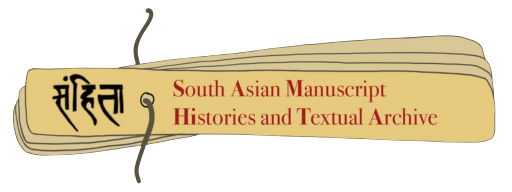Manuscripts
Search Filter
Prabodhacandrodaya
EAP1023/19/13 Language : Sanskrit Scripts : Newari
Excerpt from the 11th-century Sanskrit drama by Kṛṣṇamiśra depicting the battle between Mahāmoha (‘great delusion’) and Viveka (‘discrimination) in the mind of man (Puruṣa), written in Newari script
Tripura Mantrabheda Prakāśa
EAP1023/19/14 Language : Sanskrit Scripts : Devanagari
A tantra text in praise of Goddess Tripurasundarī, celebrated as Parāśakti (the supreme power) in Nepali Śrī-Vidyā Tantra, authored by Ramachandra (for a work of the same title authored by Prakaśa Chandra, see Jeffrey Lidke 2017)
Badarī Māhātmya
EAP1023/19/16 Language : Sanskrit Scripts : Devanagari
Badarī Māhātmya is a part of Skanda Purāṇa. It is composed as a dialogue between Śiva and Skanda where Śiva describes Badarīkāśrama.
Mayūracitra
EAP1023/19/17 Language : Sanskrit Scripts : Devanagari
A text on jyotiṣa; folios after 21 are missing. This may be the 'Mayuracitraka' attributed to Nārada that describes signs of impending rain in the atmosphere; f. 19r says 'iti mayūracitrakākhye saddyo vrishti lakshanam'
Daśa Slokī
EAP1023/19/18 Language : Sanskrit Scripts : Devanagari
This work of Dharmaśāstra authored by Nāgeśa Bhaṭṭa claims to be based on the Triṁśacchlokī, and may be his Āśaucanirṇaya with a variant title.
Gayatrī Kavaca
EAP1023/19/19 Language : Sanskrit Scripts : Devanagari
This text from the Agastyasmṛti is in the form of a conversation between Nārada and Nārāyaṇa. It is believed to remove to remove the effects of bad omens and the sins of those who recite or listen to it daily.
Kāśīkhaṇḍa
EAP1023/19/20 Language : Sanskrit Scripts : Devanagari
Excerpts from the Kāśīkhaṇḍa, the fourth book of the Skanda Purāṇa, including Chapters 26, 29 and 96, on sadācāra (good conduct), norms for women, and the story of Vyāsa’srelease from a curse
Sarasvatī Stava
EAP1023/19/21 Language : Sanskrit Scripts : Devanagari
A stotra to Sarasvatī, goddess of learning and the arts, recited by King Aśvatara in the Mārkaṇḍeya Purāṇa, Chapter 23, verses 30–58. Though the colophon mentions Aśvatara, it references ‘Pitā-Putra Samvad’, which are Chapter 10–12 in the Vrindavandas edition of 1941. The two dates given are discrepant: 1715 Śaka Saṃvat and 1899 Vikram Saṃvat (1793 and 1842 CE); in the second, the last two figures are struck out and rewritten in the margin.
Vivāha Vara pūjā Vidhi
EAP1023/19/22 Language : Sanskrit Scripts : Devanagari
In Hindu weddings, the groom is considered a form of Mahāviṣṇu and the bride of Lakṣmī. This text describes the ritual of the pūjā offered to the groom, known as ‘Varaṇī’
Rāmāryāśanamaṣādhikaṁ Stotra
EAP1023/19/23 Language : Sanskrit Scripts : Devanagari
A composition in praise of Rāma by Mudgala Bhaṭṭa, consisting of 108 verses in Ārya metre, a.k.a. 'Rāmāryā' and Āryāṣṭottaraśata.
Rudra Paddhati
EAP1023/19/24 Language : Sanskrit Scripts : Devanagari
Rudrapaddhati [Rudrānuṣṭhānapaddhati] is ascribed to Nārāyaṇa Bhaṭṭa, a 16th-century author on Sanskrit prosody and authority on Dharmaśāstra. This manuscript describes the consecration ritual for Mahādeva.
Śārīrakamīmāṃsā Bhāṣya
EAP1023/19/25 Language : Sanskrit Scripts : Devanagari
An Advaita text, whose first folio corresponds to the second adhyāya of Adi Sankara’s bhaśya on Bādarayāṇa’s Brahmasūtra-s, also known as Śārīrakamīmāṃsā (Śārīrakamīmāṃsā Bhāṣya 2.1.1).













